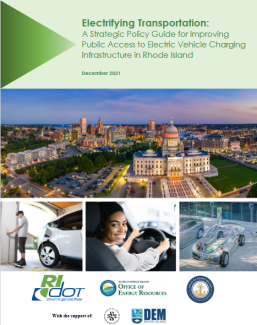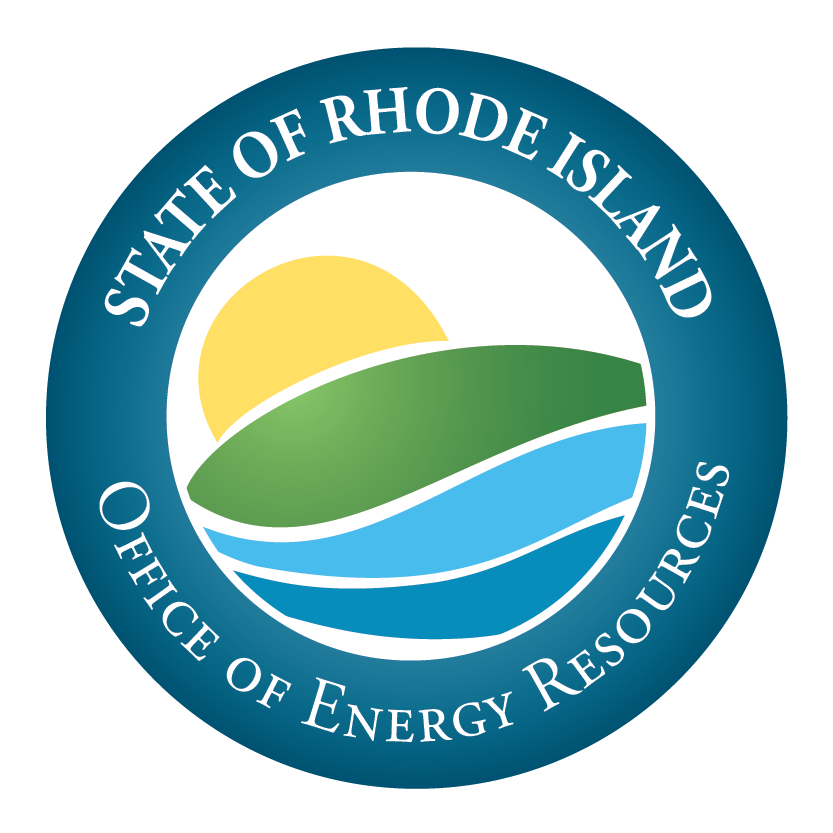Electrifying Transportation
A Strategic Policy Guide for Improving Public Access to Electric Vehicle Charging Infrastructure in Rhode Island

In 2021, the Rhode Island General Assembly passed bills H5031/S0994, which direct the Department of Transportation (RIDOT), the Division of Motor Vehicles (DMV), and the Office of Energy Resources (OER) to “develop, no later than January 1, 2022, a plan for a statewide electric vehicle charging station infrastructure in order to make such electric vehicle charging stations more accessible to the public.”
In response, RIDOT, DMV, and OER, along with representatives from the Rhode Island Department of Environmental Management (RIDEM) and Rhode Island Department of Health (RIDOH) – collectively the Project Team – developed Electrifying Transportation: A Strategic Policy Guide for Improving Public Access to Electric Vehicle Charging Infrastructure in Rhode Island.
The intent of this Strategic Policy Guide is threefold: First, the Project Team reviews the status quo of electric vehicles and their charging infrastructure, as well as current and prior programming. The purpose of this review is to establish where Rhode Island is with vehicle electrification as we look ahead to 2022. Second, the Project Team distills needs and recommendations heard from three months of public comment, three public listening sessions (key slides from those listening sessions are available here), and over two dozen one-on-one meetings with agencies and external stakeholder organizations. The purpose of this is to prioritize what we heard as the most critical items to integrate into future policies and programs. Third, the Strategic Policy Guide will be a working document from which agencies – and stakeholders – can coalesce around priorities and coordinate action in the years to come.
We have discerned the following key priorities for our work in the coming years:
- Reinvest in incentive programs for electric vehicles and charging infrastructure;
- Refine electric vehicle and charging infrastructure programs to align with priorities and to center equity such that benefits accrue to underserved and overburdened communities;
- Demonstrate progress in electrifying transit, school buses, and medium- and heavy-duty vehicles in order to reduce harmful emissions and improve public health;
- Conduct an analysis to understand transportation revenue impacts and develop recommendations for future action to ensure sustainable funding streams;
- Support a 100% Renewable Energy Standard to ensure electric transportation is truly decarbonized;
- Develop a clean transportation dashboard to track progress; and
- Demonstrate action through state agency commitments and accountability.
The Project Team and other partner agencies represented by the Executive Climate Change Coordinating Council (EC4) view the publication of this Strategic Policy Guide not as an end to our work, but as the start of our coordinated actions to improve public access to – and benefits from – the transition to a decarbonized transportation sector. Each agency has identified and committed to a specific priority action in 2022. All actions are described within the Strategic Policy Guide in the context of addressing priority needs. Agencies will be held accountable through routine report-outs to the EC4 at public meetings, and progress will be tracked via a public clean transportation dashboard.
For more information about this project, please contact Sara Canabarro at sara.canabarro@energy.ri.gov.
